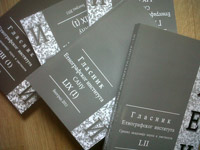Уклета места и уклета пракса. Потрага за благом и уклета места Студија случаја из Грчке
UDC 398.32(=14) 316.72:39(495)
Сажетак
Циљ овог рада је да објасни зашто је широко распрострањена пркаса потраге за благом повезана са наративима о проклетим и уклетим местима. За ово постоји неколико разлога: а) преплитање елемената званичне религије и фолклорне традиције у хришћанском православљу које често служи грчким националистима за успостављање идеје континуитета од антике до данас, б) постојање злих сила даје довољно оправдања за очај, неуспех или болест повезујући Другост са несрећом, ц) овакви наративи формирају обрасце понашања и отварају простор за успостављање дијалога између појмова као што су добро и зло, као и између религиозних веровања и скептицизма.
Кључне речи: крађа блага, зле силе, ђаво, црни човек, свиња, дискурс о уклетом, наративност
Reference
Athens 1985 (in Greek).
Alexakis, Identity and otherness. Symbols, relationship and community in Greece
and the Balkans, Dodoni, Athens 2001 (in Greek).
Babcock, B., (ed.), The Reversible World, Ithaca, Cornell University Press, New
York, 1978.
Baïbakis, I., Lost treasures in Greece, Archetypo, Thessaloniki, 2005 (in Greek).
Bennett, G., (ed.), Legend: Performance and Truth in: Contemporary Legend, a
Reader, Garland Publishing, New York & London 1996.
Blum R., & Blum E., The Lore of Crisis and Mystery in Rural Greece, Archetypo,
Thessaloniki, 2005 (“The dangerous hour”, translated from the English by
Argyro Patsou-Veloudou) (in Greek).
Campbell, J., Honour, Family and Patronage, Clarendon, Oxford 1964.
Crick, M., Explanations in Language and Meaning, Croom Helm, London 1976.
Csikszentmihalyi, M. & Rochberg-Halton, E., The Meaning of Things: Domestic
Symbols and the Self, Cambridge University Press, Cambridge, 1981.
Damianou, D., Folklore Narrations, Society for the Cytheran Studies, Athens 2005
(in Greek).
du Boulay, J., The Greek Vampire : Symbolism in Marriage and Death, Man 17 ,
1982, 219-138.
Fyndakis,V., The gold-bearing Paggaio in International History, Thessaloniki,
2004 (in Greek).
Herzfeld, M., On the Ethnography of “prejudice” in an Exclusive Community, Ethnic
Groups 2, 1980a, 283-305.
Hirschon R., Heirs of the Greek catastrophe, Clarendon Press, Oxford 1989
Imellos, St., On Folklore, vol. A’, Athens, 1988 (in Greek).
Kyriakidou-Nestoros, A., Signs of the place or the logic of the Greek lаndscape,
Folklore studies, Olkos, Athens 1975 (in Greek).
Lagopoulos, Ph., The sky over the earth, Odysseas, Athens 2003 (in Greek).
Matzouranis, K., Traditions of Kynouria, Laografia 4, Athens 1913 (in Greek).
Megas, G., Issues of Greek Folklore, Athens 1975 (in Greek).
Nitsiakos V.G., Folklore compilation, Odysseas, Athens 1997. (in Greek).
Politis N., (1904), Traditions, vol.1,2, Grammata, Athens 1904 (in Greek).
Provatakis, Th., The Devil in the Byzantine Art, Thessaloniki, 1980 (in Greek).
Romeos, K., The Immortal water, Athens 1973 (in Greek).
Russell, J., Satan: The Early Christian Tradition, Cornell University Press, Ithaca
1981.
Seafield, L., (2002), Scottish Witches & Wizards, Lomond Books, New Lanark
2002.
Schinas, N., Notes on the Roads of Macedonia, vol. 2, Athens 1886 (in Greek).
Stewart, Ch., Demons and the Devil, Princeton University Press, Princeton, New
Jersey 1991.
Zeisel J., Inquiry by Design: Tools for Environment-behavior Research, Cambridge
University Press, Cambridge 1991.
<https://www.ei.sanu.ac.rs/index.php/gei/article/view/646>.
Датум приступа: 28 nov. 2025






